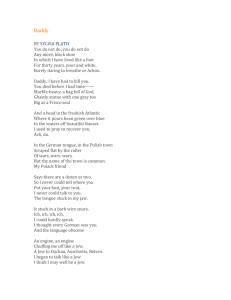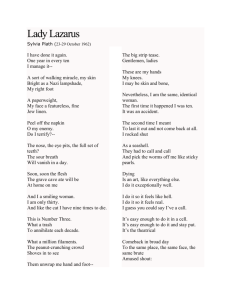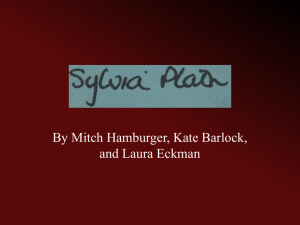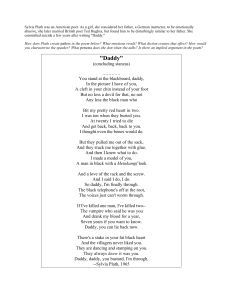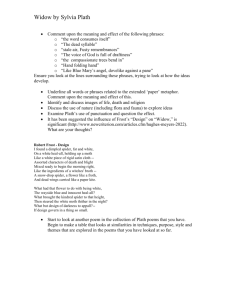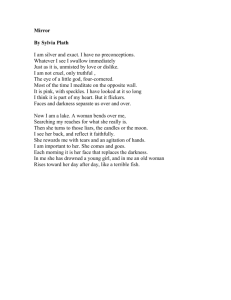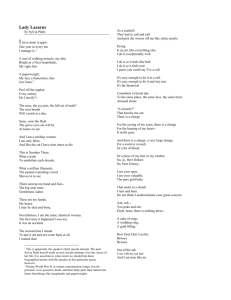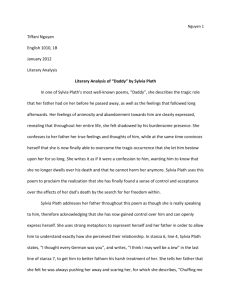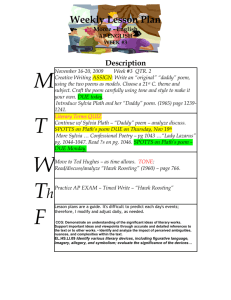Plath Poems with annotated notes
advertisement
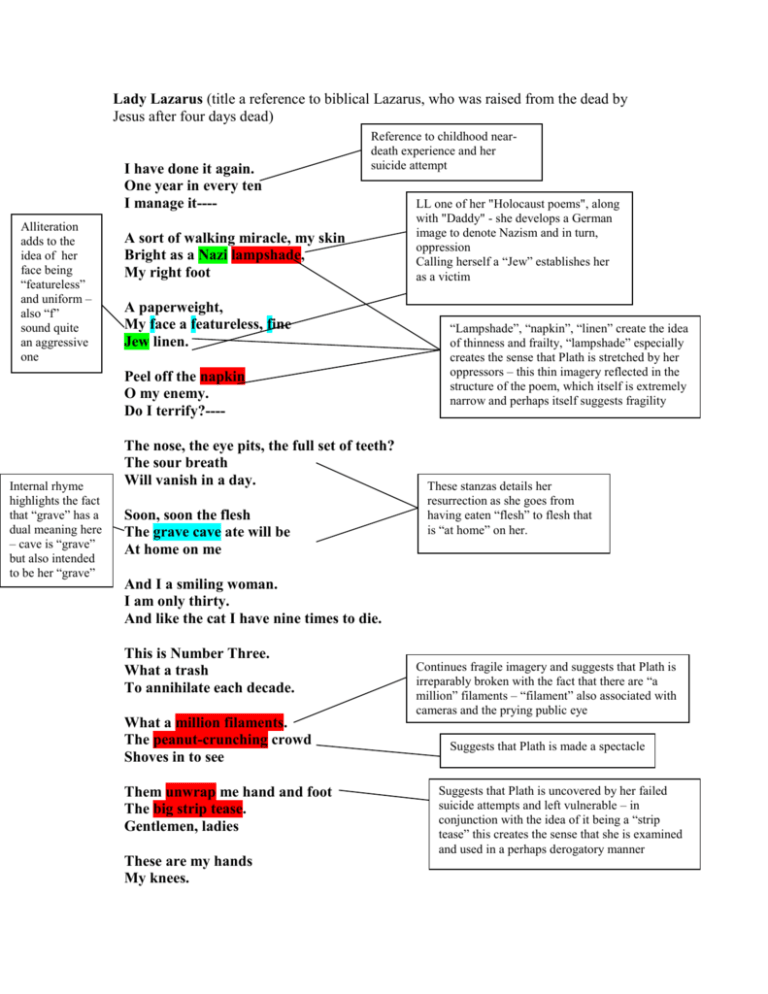
Lady Lazarus (title a reference to biblical Lazarus, who was raised from the dead by Jesus after four days dead) I have done it again. One year in every ten I manage it---Alliteration adds to the idea of her face being “featureless” and uniform – also “f” sound quite an aggressive one Reference to childhood neardeath experience and her suicide attempt A sort of walking miracle, my skin Bright as a Nazi lampshade, My right foot A paperweight, My face a featureless, fine Jew linen. Peel off the napkin O my enemy. Do I terrify?---- Internal rhyme highlights the fact that “grave” has a dual meaning here – cave is “grave” but also intended to be her “grave” The nose, the eye pits, the full set of teeth? The sour breath Will vanish in a day. Soon, soon the flesh The grave cave ate will be At home on me LL one of her "Holocaust poems", along with "Daddy" - she develops a German image to denote Nazism and in turn, oppression Calling herself a “Jew” establishes her as a victim “Lampshade”, “napkin”, “linen” create the idea of thinness and frailty, “lampshade” especially creates the sense that Plath is stretched by her oppressors – this thin imagery reflected in the structure of the poem, which itself is extremely narrow and perhaps itself suggests fragility These stanzas details her resurrection as she goes from having eaten “flesh” to flesh that is “at home” on her. And I a smiling woman. I am only thirty. And like the cat I have nine times to die. This is Number Three. What a trash To annihilate each decade. What a million filaments. The peanut-crunching crowd Shoves in to see Them unwrap me hand and foot The big strip tease. Gentlemen, ladies These are my hands My knees. Continues fragile imagery and suggests that Plath is irreparably broken with the fact that there are “a million” filaments – “filament” also associated with cameras and the prying public eye Suggests that Plath is made a spectacle Suggests that Plath is uncovered by her failed suicide attempts and left vulnerable – in conjunction with the idea of it being a “strip tease” this creates the sense that she is examined and used in a perhaps derogatory manner I may be skin and bone, Here Plath gives the “peanutcrunching” crowd what they want in a sense as she tells them of her suicide attempts and lays herself bare Nevertheless, I am the same, identical woman. The first time it happened I was ten. It was an accident. The second time I meant To last it out and not come back at all. I rocked shut Solidity, impenatrability As a seashell. They had to call and call And pick the worms off me like sticky pearls. “Dying” isolated Dying Is an art, like everything else, I do it exceptionally well. Sarcasm Reality associated with “hell” I do it so it feels like hell. I do it so it feels real. I guess you could say I've a call. It's easy enough to do it in a cell. It's easy enough to do it and stay put. It's the theatrical The trivialising and abuse of her suffering Comeback in broad day To the same place, the same face, the same brute Amused shout: 'A miracle!' That knocks me out. There is a charge Repetition throughout (similar to “some, some” earlier) creates an almost maniacal image of Plath in the reader’s head, indicative of her mental state The image of her rescuers taking pearls from her continues the idea that she is being exploited by the “peanut-crunching” crowd Oppressive “peanut-crunching” crowd all lumped into one evil “brute” – repetition of “the same” emphasises their unity Reference to the draining electroshock treatment she underwent after her first suicide attempt For the eyeing of my scars, there is a charge For the hearing of my heart---It really goes. And there is a charge, a very large charge For a word or a touch Or a bit of blood Or a piece of my hair or my clothes. So, so, Herr Doktor. So, Herr Enemy. Plays on both the ideas that her pain is exploited and that she is left scarred by this herself (she is “charged” emotionally). Repetition of “there is a charge” makes this more evident A reference to her being put on trial by the public but also the fact that she is left drained by letting the world “hear” her “heart” and exposing herself the way she does in her poems Internal rhyme highlights the word “urn” – brings to mind death and fact that Plath is “dying” slowly at the hands of an oppressive, intrusive world I am your opus, I am your valuable, The pure gold baby Ties in with idea of her being a “pearl” that is extracted, while “baby” also carries further the fragility and vulnerability of Plath That melts to a shriek. I turn and burn. More sarcasm Do not think I underestimate your great concern. More repetition and carries Ash, ash --forward “urn” image You poke and stir. Flesh, bone, there is nothing there---A cake of soap, A wedding ring, A gold filling. Herr God, Herr Lucifer Beware Beware. Out of the ash I rise with my red hair And I eat men like air. Rids herself of material associations – the “poking” and “stirring” no longer affects her as she is no longer associated with what they “poke” and “stir” Makes enemies of God and the Devil – repetition of “beware” very threatening and aggressive “air” suggests an ironic dependence despite the defiance of the last stanza Lady Lazarus is Plath getting angry at the world (men in particular) – she admits her illness but claims that the world has drained her and partially made her the way she is Widow Widow. The word consumes itself --Body, a sheet of newsprint on the fire Levitating a numb minute in the updraft Over the scalding, red topography That will put her heart out like an only eye. Widow. The dead syllable, with its shadow Of an echo, exposes the panel in the wall Behind which the secret passages lies--stale air, Fusty remembrances, the coiled-spring stair That opens at the top onto nothing at all.... Widow. The bitter spider sits And sits in the center of her loveless spokes. Death is the dress she wears, her hat and collar. The moth-face of her husband, moonwhite and ill, Circles her like a prey she'd love to kill A second time, to have him near again --- A paper image to lay against her heart The way she laid his letters, till they grew warm And seemed to give her warmth, like a live skin. But it is she who is paper now, warmed by no one. Widow: that great, vacant estate! The voice of God is full of draftiness, Promising simply the hard stars, the space Of immortal blankness between stars And no bodies, singing like arrows up to heaven. Widow, the compassionate trees bend in, The trees of loneliness, the trees of mourning. They stand like shadows about the green landscape --Or even like black holes cut out of it. A widow resembles them, a shadow-thing, Hand folding hand, and nothing in between. A bodiless soul could pass another soul In this clear air and never notice it --One soul pass through the other, frail as smoke And utterly ignorant of the way it took. That is the fear she has--the fear His soul may beat and be beating at her dull sense Like Blue Mary's angel, dovelike against a pane Blinded to all but the grey, spiritless room It looks in on, and must go on looking in on Lack of colour represents death. Plath reflected her feelings of isolation and feelings of neglect by Ted Hughes. Daddy You do not do, you do not do Any more, black shoe In which I have lived like a foot For thirty years, poor and white, Barely daring to breathe or Achoo. Daddy, I have had to kill you. You died before I had time-Marble-heavy, a bag full of God, Ghastly statue with one gray toe Big as a Frisco seal And a head in the freakish Atlantic Where it pours bean green over blue In the waters off beautiful Nauset. I used to pray to recover you. Ach, du. In the German tongue, in the Polish town Scraped flat by the roller Of wars, wars, wars. But the name of the town is common. My Polack friend Says there are a dozen or two. So I never could tell where you Put your foot, your root, I never could talk to you. The tongue stuck in my jaw. It stuck in a barb wire snare. Ich, ich, ich, ich, I could hardly speak. I thought every German was you. And the language obscene An engine, an engine Chuffing me off like a Jew. A Jew to Dachau, Auschwitz, Belsen. I began to talk like a Jew. I think I may well be a Jew. The snows of the Tyrol, the clear beer of Vienna Are not very pure or true. With my gipsy ancestress and my weird luck And my Taroc pack and my Taroc pack I may be a bit of a Jew. I have always been scared of *you*, With your Luftwaffe, your gobbledygoo. And your neat mustache And your Aryan eye, bright blue. Panzer-man, panzer-man, O You--Not God but a swastika So black no sky could squeak through. Every woman adores a Fascist, The boot in the face, the brute Brute heart of a brute like you. You stand at the blackboard, daddy, In the picture I have of you, A cleft in your chin instead of your foot But no less a devil for that, no not Any less the black man who Bit my pretty red heart in two. I was ten when they buried you. At twenty I tried to die And get back, back, back to you. I thought even the bones would do. But they pulled me out of the sack, And they stuck me together with glue. And then I knew what to do. I made a model of you, A man in black with a Meinkampf look And a love of the rack and the screw. And I said I do, I do. So daddy, I'm finally through. The black telephone's off at the root, The voices just can't worm through. If I've killed one man, I've killed two--The vampire who said he was you anddrank my blood for a year, Seven years, if you want to know. Daddy, you can lie back now. There's a stake in your fat, black heart And the villagers never liked you. They are dancing and stamping on you. They always *knew* it was you. Daddy, daddy, you bastard, I'm through. Interpretations Daddy portrays Plath’s deep attachment to the memory of her Father, so much so that she’s willing to take her life to see him again. The poem is also a homage of sorts to her Jewish ancestry. Also seen as an outlet where Plath has channeled her rage and oppressive feelings from her adulterer husband and dominating Father, who has caused so much unhappiness in her life. o Symbolizes her relationship with her Father as a Jew to a Nazi - oppressor and oppressed Themes Nazi / Jewish theme Symbols sharply representing the relationship between her father and herself – emphasizing an alienated / harsh / detached connection they shared Embodying a Jew and symbolizing her father as a Nazi– she immediately creates immense and controlling characteristics associated to him. Lots of reference to body parts, such as foot, toe, tongue and jaw. May be reference to Nazi torture or her dad’s amputation. Structure 16 stanzas, 5 lines each Opening lines of the first stanza are a rhyming couplet, ending lines of the last stanza are a rhyming couplet. Images of Father “Bag full of God” – Makes it seem as though her father is Godlike and looks to him as a role model Nazi related images to describe her father o Drawing physical parallels between Father and Hitler “Your neat mustache” “And your Aryan eye” Portrays father as the Devil in the 11th and 12th stanza Imagery Strong images to convey oppression / hatred for Father and Husband Title – relates to selfinfliction and mutilation Hinge represents links to a door, as a release for her. Structure links to image. Imagery of thanksgiving, little pilgram links to the thumb, and turkey wattle and carpet rolls possible reference to blood. Drunk on pain (euphoria), no ill feelings result from the cut – control, relief. Rush of blood, link to civil war – battle with depression perhaps. Link to KKK hat, through the feeling of the bandage. References to figures to death. Kamikaze links to suicide. Reference to dolls, presenting layers. Cut For Susan O'Neill Roe What a thrill --- My thumb instead of an onion. The top quite gone Except for a sort of a hinge Of skin, A flap like a hat, Dead white. Then that red plush. Little pilgrim, The Indian's axed your scalp. Your turkey wattle Carpet rolls Straight from the heart. I step on it, Clutching my bottle Of pink fizz. Suggestion of deliberate cut, with a sense of exhilaration. Playful tone, with no worries. Detached – paradox of hinge. Possible reference to death of distance from self. It – blood, doesn’t trouble her anymore. Image of spurting blood from her thumb. A celebration, this is. Out of a gap A million soldiers run, Redcoats, every one. Whose side are they on? O my Homunculus, I am ill. I have taken a pill to kill The thin Papery feeling. Saboteur, Kamikaze man --The stain on your Gauze Ku Klux Klan Babushka Darkens and tarnishes and when The balled Pulp of your heart Confronts its small Recognition of depression, and reference to suicide attempt. Realization of weirdness. Internal battle with her conscious. Mill of silence How you jump --Trepanned veteran, Dirty girl, Thumb stump. Self-loathing tone contradicts the earlier
